Black Friday and Cyber Monday can be the most profitable and most chaotic days of the year for eCommerce brands.
Order volumes skyrocket, best-sellers sell out in hours, and one small inventory mistake can cost thousands in lost revenue or refunds.
The difference between record-breaking sales and operational disaster often comes down to how well you manage your stock.
That’s why having the right inventory management software is crucial before the BFCM rush begins.
In this guide, we’ve rounded up the best inventory management solutions for BFCM 2025, whether you’re a fast-scaling Shopify brand, a high-volume multichannel seller, or a small business looking to automate inventory workflows.
Why Inventory Management Matters More Than Ever for BFCM 2025
Black Friday and Cyber Monday aren’t just big they’re the make-or-break sales events of the year.
In 2024, U.S. consumers spent over $38 billion during BFCM weekend alone, and 2025 is projected to be even bigger.
But with that surge in demand comes intense operational pressure: products move faster, order volumes spike overnight, and even small inventory mistakes can lead to overselling, stockouts, and disappointed customers.
Effective inventory management is what separates smooth, profitable sales from chaotic, costly mistakes. When done right, it ensures that:
- Best-sellers stay in stock: You don’t lose revenue because a top-selling item ran out mid-sale.
- Stock levels are accurate everywhere: Orders sync instantly across Shopify, Amazon, eBay, and other channels, preventing double-selling.
- Replenishment happens on time: Automated reorder points and forecasts help you restock before inventory runs low.
- Cash flow stays healthy: You’re not tying up money in overstock that won’t sell during BFCM.
Here is the list of top inventory management tools for BFCM:
Sumtracker
Sumtracker is a robust inventory management solution, recommended by Shopify, built for modern eCommerce. It helps to keep Shopify, Amazon, Etsy, eBay, and other channels in sync, replenishing inventory, and eliminating overselling, making it ideal for the high-stakes BFCM rush.
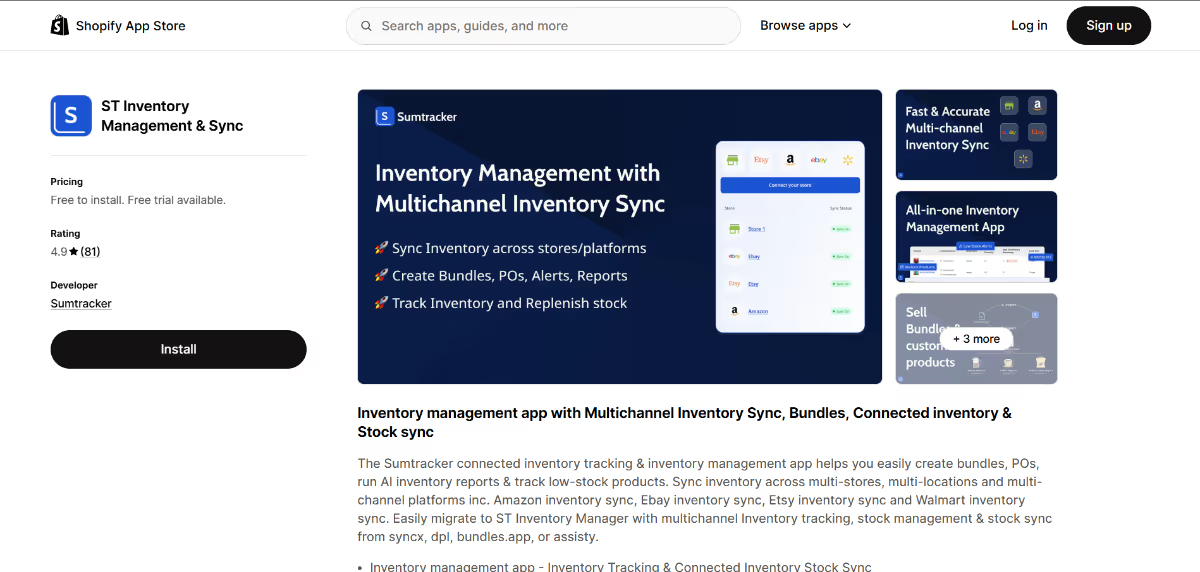
Key Features
- Real-time stock sync across Shopify, Amazon, Etsy, eBay, Walmart, and more.
- Bundle and kit management with automatic component tracking.
- Purchase order creation, tracking, and cost management.
- Smart replenishment suggestions based on sales history.
- Multi-location tracking and low-stock alerts.
Best For: Multichannel Shopify merchants and growing D2C brands that want fast, reliable inventory sync and restocking automation.
Pros:
- Intuitive UI and fast onboarding
- Bundle support and multi-store sync
- Detailed restock reports and actionable insights
Cons:
- Lacks advanced shipping or fulfillment features.
- Not suitable for businesses that manufacture in-house.
Pricing: Starts at $49/month, pricing scales with order volume.
Cin7 Core
Cin7 Core (formerly DEAR Systems) is an advanced inventory and order management platform built for scaling businesses. It centralizes stock, orders, purchasing, and warehouse operations into one system, perfect for brands juggling high order volumes during BFCM.
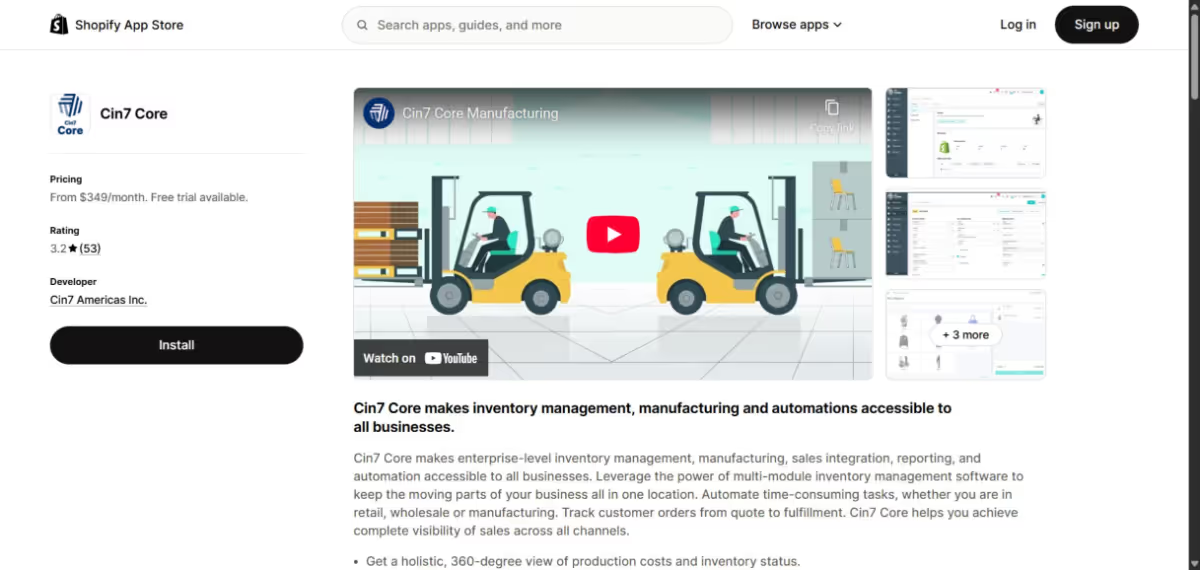
Key Features
- Centralized inventory, order, and warehouse management.
- Advanced reporting and analytics.
- EDI, 3PL, and accounting integrations.
- POS and retail support for omnichannel operations.
Best For: Mid-to-large businesses managing multiple warehouses, channels, and complex supply chains.
Pros:
- Highly scalable and feature-rich
- Great for hybrid online-offline businesses
- Extensive third-party integrations
Cons:
- Steeper learning curve
- Higher starting price point
Pricing: Starts at $349/month for the Core plan.
Zoho Inventory
Zoho Inventory is a simple and cost-effective solution that helps small and growing e-commerce businesses track stock, automate reorders, and sync sales channels. Its integration with the Zoho ecosystem makes it especially appealing to startups already using Zoho tools.
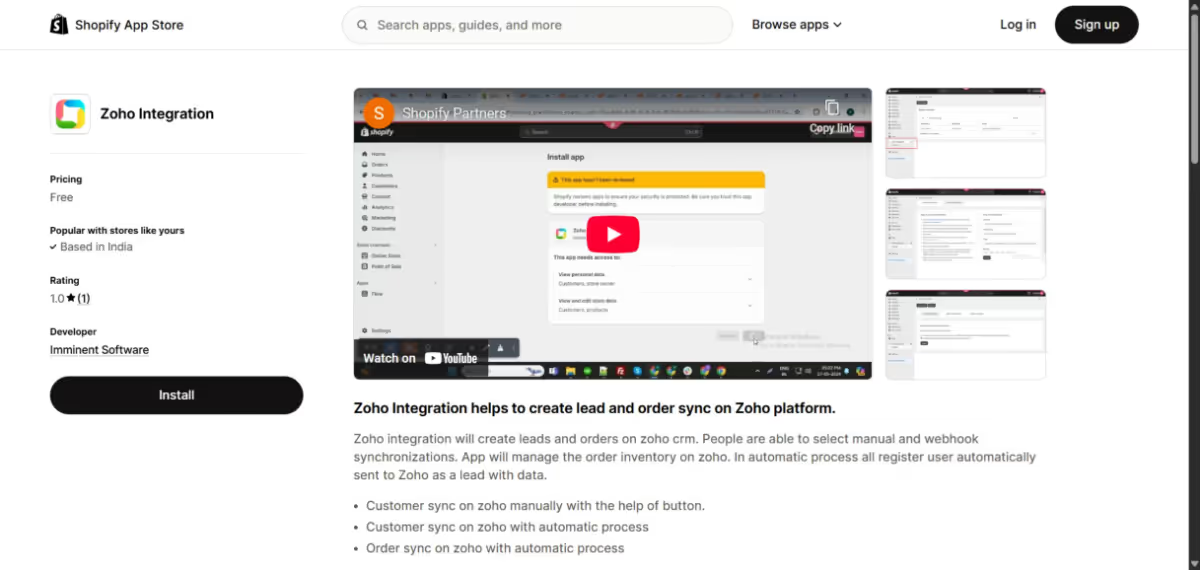
Key Features
- Multichannel sales integration with marketplaces and stores.
- Warehouse and stock transfer management.
- Reorder points and low-stock alerts.
- Batch/serial number tracking.
Best For: Startups and small online stores seeking affordable, easy-to-use inventory control.
Pros:
- Free plan available for small sellers
- Easy to set up and use
- Strong Zoho app ecosystem integration
Cons:
- Limited orders and warehouses on lower plans
- Advanced automation available only on higher tiers
Pricing: Plans start at $29/month.
Katana Cloud Inventory
Katana is a cloud-based inventory and manufacturing platform designed for brands that produce their own products. It connects sales, production, and inventory in one place, so you always know what’s in stock, what’s being made, and what needs replenishment before BFCM hits.
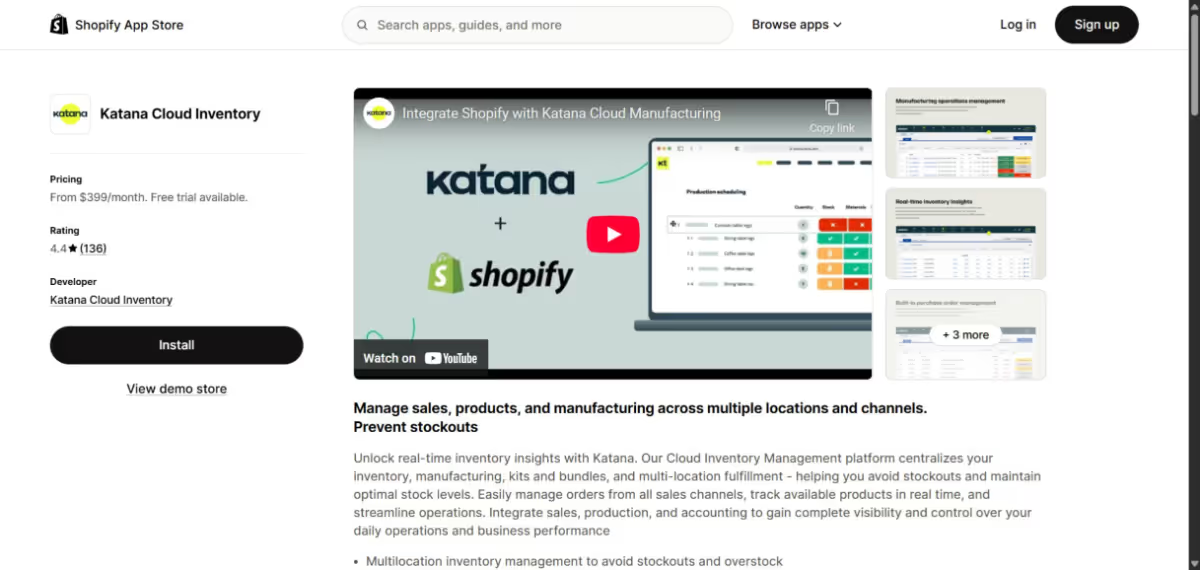
Key Features
- BOM and production order management.
- Real-time stock control for raw materials and finished goods.
- Smart order allocation and routing.
- Integrations with Shopify, accounting tools, and ERPs.
Best For: D2C brands and manufacturers needing end-to-end visibility from raw materials to finished products.
Pros:
- Excellent for production-based businesses
- Clean, user-friendly interface
- Automates stock allocation to orders
Cons:
- Limited marketplace integrations
- Not ideal for pure retailers or resellers
Pricing: Starts at $349/month, higher tiers available for scaling operations.
Inventory Planner by Sage
Inventory Planner is purpose-built for smarter purchasing decisions. It uses predictive analytics to forecast demand, suggest optimal reorder points, and help you plan inventory around seasonal spikes like BFCM reducing overstock and preventing stockouts.
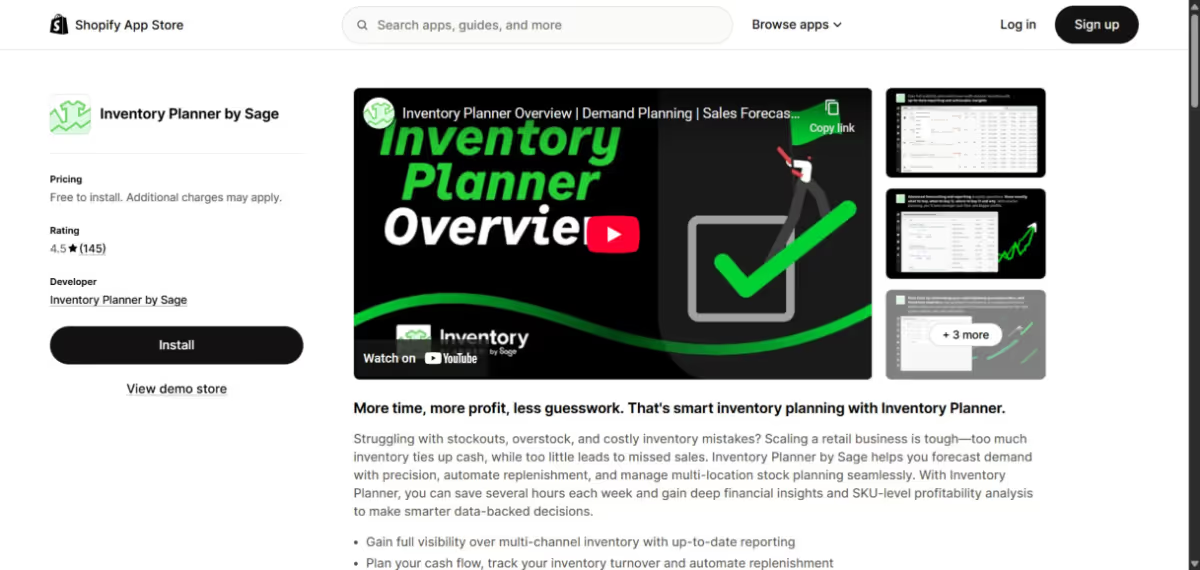
Key Features
- Predictive demand forecasting with historical sales data.
- Replenishment and purchase order automation.
- Detailed analytics and SKU-level reporting.
- Seamless integrations with major eCommerce platforms.
Best For: Brands with large SKU catalogs or seasonal demand cycles that want data-driven replenishment.
Pros:
- Industry-leading forecasting accuracy
- Reduces cash tied up in overstock
- Unlimited users on most plans
Cons:
- Pricing can be high for small businesses
- Learning curve for advanced forecasting features
Pricing: Custom pricing for larger businesses.
SKULabs
SKULabs is an all-in-one inventory, order, and fulfillment platform that helps you manage stock, pick-pack-ship workflows, and multichannel syncing, all from one dashboard. It’s ideal for businesses that want total control over inventory and logistics during the Black Friday chaos.
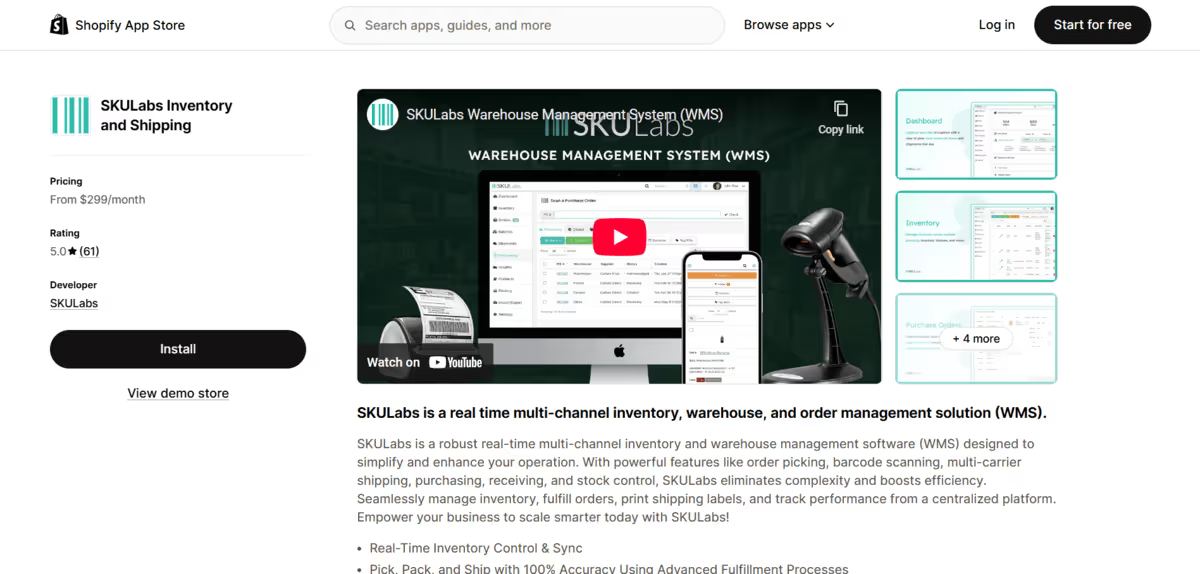
Key Features
- Centralized inventory management with real-time channel sync.
- Advanced picking, packing, and shipping workflows.
- Barcode scanning and order accuracy tools.
- Low-stock alerts and purchase order management.
Best For: eCommerce and retail businesses that want to unify inventory and fulfillment workflows.
Pros:
- Excellent fulfillment and warehouse features
- Improves picking accuracy and reduces errors
- Great multichannel order visibility
Cons:
- Slightly steeper learning curve
- Interface feels dated compared to newer tools
Pricing: Starts at $299/month for small teams; pricing scales with order volume.
Finale Inventory
Finale Inventory is a robust cloud-based inventory management platform built to handle thousands of SKUs and rapid order flows, making it ideal for high-volume sellers during Black Friday and Cyber Monday. Its powerful integrations and automation capabilities help keep stock levels accurate even when orders surge.
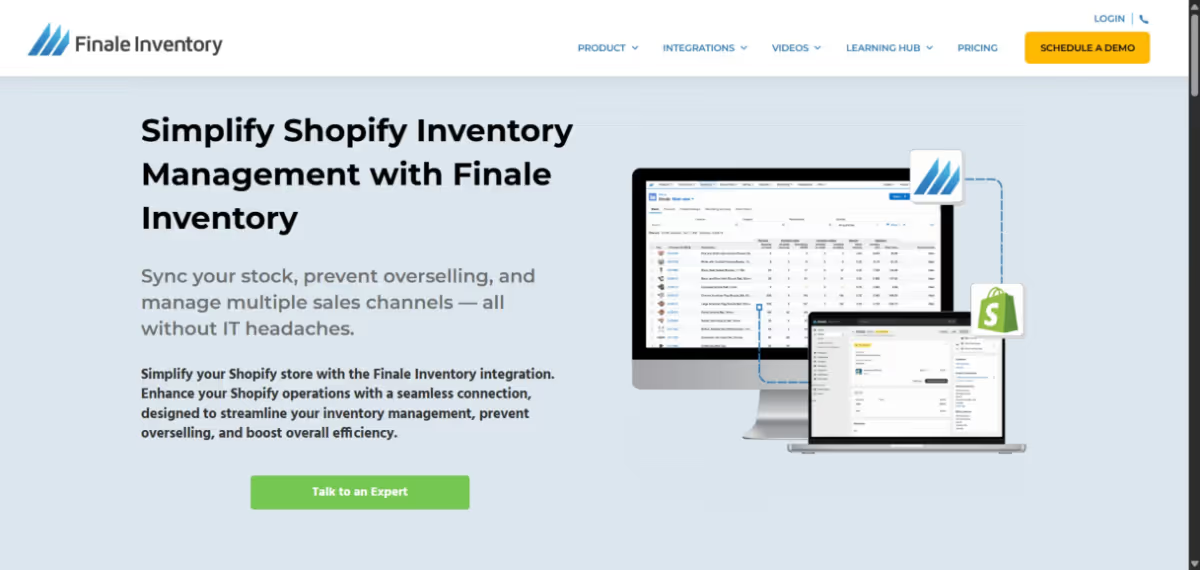
Key Features
- Real-time multichannel syncing across Shopify, Amazon, eBay, and more.
- Barcode-based inventory tracking and warehouse control.
- Purchase order automation and supplier management.
- Comprehensive reporting and reorder point automation.
Best For: High-growth brands and wholesalers managing large SKU catalogs across multiple sales channels.
Pros:
- Handles high SKU counts and rapid order volumes easily
- Excellent barcode and warehouse capabilities
- Highly customizable workflows
Cons:
- Dated UI and onboarding complexity
- Pricing is quote-based and can get expensive for enterprise needs
Pricing: Starts around $499/month for core plans; enterprise pricing is available on request.
Craftybase
Craftybase is an inventory and production management solution built specifically for makers, artisans, and small-batch brands. It goes beyond standard stock tracking by handling raw materials, batch production, and COGS, giving handmade sellers full visibility into their costs and inventory before BFCM hits.
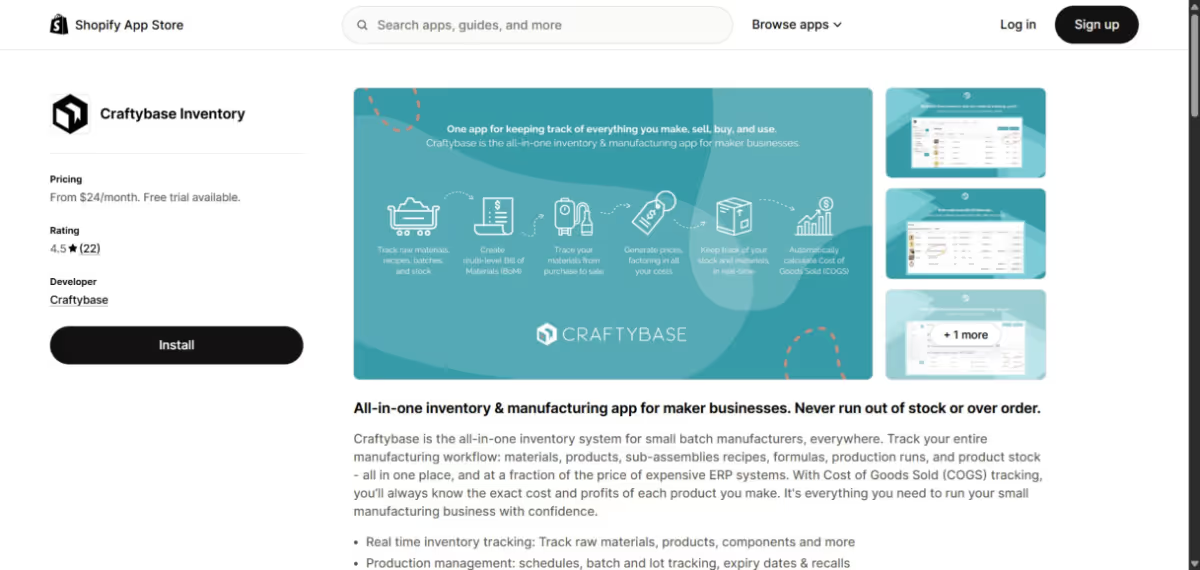
Key Features
- Raw material and component tracking.
- Automated COGS calculations and profitability insights.
- Batch production tracking and compliance logs.
- Sales and expense reporting with tax-ready summaries.
Best For: Small-batch makers, handmade brands, and craft sellers who need granular material tracking and cost visibility.
Pros:
- Purpose-built for handmade and small-scale businesses
- Strong cost tracking and production tools
- Easy to use and quick to set up
Cons:
- Not ideal for large-scale or multichannel operations
- Limited automation and forecasting features
Pricing: Starts at $24/month
NetSuite ERP
NetSuite ERP is a comprehensive, enterprise-grade solution that integrates inventory, financials, CRM, and supply chain operations under one platform. It’s designed for large retailers and global eCommerce brands managing complex logistics, multiple subsidiaries, and high-volume sales during BFCM.
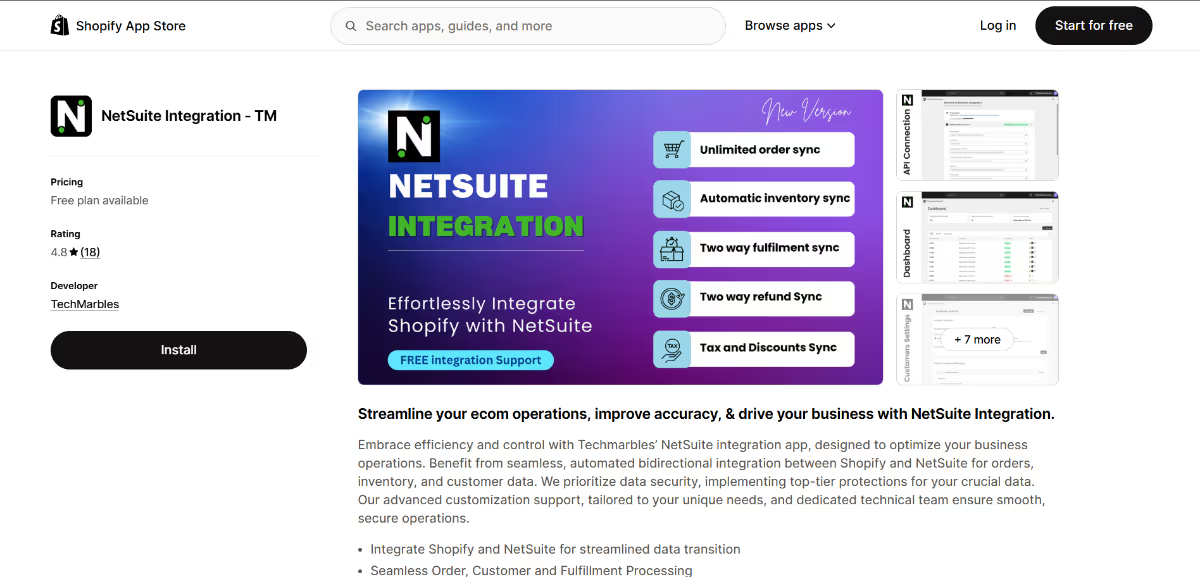
Key Features
- Advanced inventory, warehouse, and order management.
- Global supply chain and multi-entity support.
- Built-in demand forecasting and procurement planning.
- Real-time analytics and financial reporting.
Best For: Large enterprises and scaling brands that need a unified ERP with advanced inventory and financial capabilities.
Pros:
- End-to-end business management in one platform
- Extremely scalable and customizable
- Robust forecasting, reporting, and automation features
Cons:
- High setup cost and long implementation time
- Requires training and dedicated team for full use
Pricing: Custom pricing based on modules and company size (typically starts around $999/month+).
Unleashed Inventory
Unleashed is a powerful inventory and order management platform designed for B2B and wholesale businesses. It combines inventory control, purchasing, production, and sales management making it ideal for companies dealing with large order volumes and complex supply chains during BFCM.
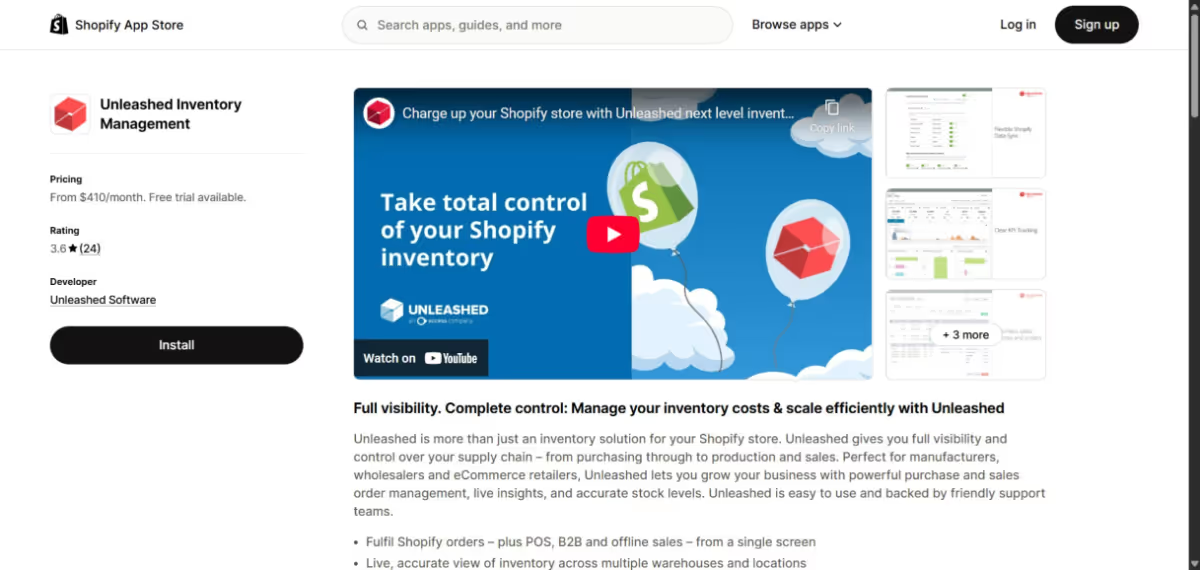
Key Features
- Real-time inventory tracking across multiple warehouses.
- BOM and manufacturing workflow support.
- Purchase order and supplier management.
- Detailed reporting on margins, sales, and stock movement.
Best For: Wholesale, B2B, and manufacturing-focused businesses that need strong supply chain visibility and order management.
Pros:
- Excellent for complex B2B and manufacturing workflows
- Strong reporting and profitability insights
- Scales well with growing product lines
Cons:
- Less suited for small D2C brands
- UI can feel overwhelming for new users
Pricing: Starts at $410/month for core plans; custom pricing for enterprise needs.
Conclusion
Black Friday and Cyber Monday are intense but with the right inventory management tool, they don’t have to be overwhelming.
The difference between record-breaking sales and costly stockouts often comes down to how well you can track, forecast, and replenish your products in real time.
Whether you’re a small Shopify brand needing simple automation or a fast-growing multichannel business managing thousands of SKUs, the tools above offer powerful ways to stay in control when demand surges.
If you’re looking for a platform that combines fast multichannel syncing, accurate stock tracking, powerful replenishment suggestions, and an intuitive interface, Sumtracker brings it all together.
With Sumtracker powering your inventory, you can focus less on stock headaches and more on maximizing sales this BFCM season.
FAQs
Why do I need inventory management software for BFCM?
Sales volumes skyrocket during Black Friday and Cyber Monday and even minor mistakes can lead to overselling, stockouts, and revenue loss. A dedicated inventory tool helps you track stock in real-time, automate reordering, and forecast demand, so you can sell confidently at scale.
What’s the best inventory tool for multichannel selling?
If you sell across platforms like Shopify, Amazon, Etsy, and eBay, a tool like Sumtracker is excellent because it syncs inventory instantly across all channels, preventing double-selling and stock mismatches.
How far in advance should I set up my inventory tool before BFCM?
Ideally, start at least 4–6 weeks before BFCM. This gives you enough time to integrate all sales channels, clean up your product data, and set up forecasting, reorder points, and automations.
Are these inventory tools compatible with Shopify?
Absolutely. Every tool listed here integrates with Shopify, and most also support Amazon, eBay, Etsy, and other major marketplaces, making them perfect for omnichannel eCommerce brands.
Conclusion
Ready to Simplify Your Inventory Management?
Join hundreds of e-commerce merchants who rely on Sumtracker to save time, eliminate errors, and grow their business.
.svg)



.avif)
.png)